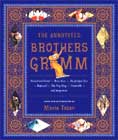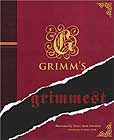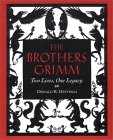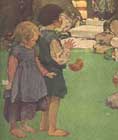

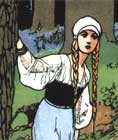
Author's Notes
translated by Margaret Hunt
Return
to
Household Tales:
Table of Contents
Previous
Tale:
The Young Giant
Next
Tale:
The King of the Golden Mountain
SurLaLune Fairy Tales Main Page
The
Gnome
THERE was once upon a time a rich
King who had three daughters, who daily went to walk in the palace garden,
and the King was a great lover of all kinds of fine trees, but there was
one for which he had such an affection, that if anyone gathered an apple
from it he wished him a hundred fathoms underground. And when harvest
time came, the apples on this tree were all as red as blood. The three
daughters went every day beneath the tree, and looked to see if the wind
had not blown down an apple, but they never by any chance found one, and
the tree was so loaded with them that it was almost breaking, and the
branches hung down to the ground. Then the King's youngest child had a
great desire for an apple, and said to her sisters, "Our father loves
us far too much to wish us underground, it is my belief that he would
only do that to people who were strangers." And while she was speaking,
the child plucked off quite a large apple, and ran to her sisters, saying,
"Just taste, my dear little sisters, for never in my life have I
tasted anything so delightful." Then the two other sisters also ate
some of the apple, whereupon all three sank deep down into the earth,
where they could hear no cock crow.
When mid-day came, the King wished to call them to come to dinner, but
they were nowhere to be found. He sought them everywhere in the palace
and garden, but could not find them. Then he was much troubled, and made
known to the whole land that whosoever brought his daughters back again
should have one of them to wife. Hereupon so many young men went about
the country in search, that there was no counting them, for every one
loved the three children because they were so kind to all, and so fair
of face. Three young huntsmen also went out, and when they had travelled
about for eight days, they arrived at a great castle, in which were beautiful
apartments, and in one room a table was laid on which were delicate dishes
which were still so warm that they were smoking, but in the whole of the
castle no human being was either to be seen or heard. They waited there
for half a day, and the food still remained warm and smoking, and at length
they were so hungry that they sat down and ate, and agreed with each other
that they would stay and live in that castle, and that one of them, who
should be chosen by casting lots, should remain in the house, and the
two others seek the King's daughters. They cast lots, and the lot fell
on the eldest; so next day the two younger went out to seek, and the eldest
had to stay home. At mid-day came a small, small mannikin and begged for
a piece of bread, then the huntsman took the bread which he had found
there, and cut a round off the loaf and was about to give it to him, but
whilst he was giving it to the mannikin, the latter let it fall, and asked
the huntsman to be so good as to give him that piece again. The huntsman
was about to do so and stooped, on which the mannikin took a stick, seized
him by the hair, and gave him a good beating. Next day, the second stayed
at home, and he fared no better. When the two others returned in the evening,
the eldest said, "Well, how have you got on?"
"Oh, very badly," said he, and then they lamented their misfortune together, but they said nothing about it to the youngest, for they did not like him at all, and always called him Stupid Hans, because he did not exactly belong to the forest. On the third day, the youngest stayed at home, and again the little mannikin came and begged for a piece of bread. When the youth gave it to him, the elf let it fall as before, and asked him to be so good as to give him that piece again. Then said Hans to the little mannikin, "What! canst thou not pick up that piece thyself? If thou wilt not take as much trouble as that for thy daily bread, thou dost not deserve to have it." Then the mannikin grew very angry and said he was to do it, but the huntsman would not, and took my dear mannikin, and gave him a thorough beating. Then the mannikin screamed terribly, and cried, "Stop, stop, and let me go, and I will tell thee where the King's daughters are." When Hans heard that, he left off beating him and the mannikin told him that he was an earth mannikin, and that there were more than a thousand like him, and that if he would go with him he would show him where the King's daughters were. Then he showed him a deep well, but there was no water in it. And the elf said that he knew well that the companions Hans had with him did not intend to deal honourably with him, therefore if he wished to deliver the King's children, he must do it alone. The two other brothers would also be very glad to recover the King's daughters, but they did not want to have any trouble or danger. Hans was therefore to take a large basket, and he must seat himself in it with his hanger and a bell, and be let down. Below were three rooms, and in each of them was a princess, with a many-headed dragon, whose heads she was to comb and trim, but he must cut them off. And having said all this, the elf vanished. When it was evening the two brothers came and asked how he had got on, and he said, "pretty well so far," and that he had seen no one except at mid-day when a little mannikin had come and begged for a piece of bread, that he had given some to him, but that the mannikin had let it fall and had asked him to pick it up again; but as he did not choose to do that, the elf had begun to lose his temper, and that he had done what he ought not, and had given the elf a beating, on which he had told him where the King's daughters were. Then the two were so angry at this that they grew green and yellow. Next morning they went to the well together, and drew lots who should first seat himself in the basket, and again the lot fell on the eldest, and he was to seat himself in it, and take the bell with him. Then he said, "If I ring, you must draw me up again immediately." When he had gone down for a short distance, he rang, and they at once drew him up again. Then the second seated himself in the basket, but he did just the same as the first, and then it was the turn of the youngest, but he let himself be lowered quite to the bottom. When he had got out of the basket, he took his hanger, and went and stood outside the first door and listened, and heard the dragon snoring quite loudly. He opened the door slowly, and one of the princesses was sitting there, and had nine dragon's heads lying upon her lap, and was combing them. Then he took his hanger and hewed at them, and the nine fell off. The princess sprang up, threw her arms round his neck, embraced and kissed him repeatedly, and took her stomacher, which was made of pure gold, and hung it round his neck. Then he went to the second princess, who had a dragon with five heads to comb, and delivered her also, and to the youngest, who had a dragon with four heads, he went likewise. And they all rejoiced, and embraced him and kissed him without stopping. Then he rang very loud, so that those above heard him, and he placed the princesses one after the other in the basket, and had them all drawn up, but when it came to his own turn he remembered the words of the elf, who had told him that his comrades did not mean well by him. So he took a great stone which was lying there, and placed it in the basket, and when it was about half way up, his false brothers above cut the rope, so that the basket with the stone fell to the ground, and they thought that he was dead, and ran away with the three princesses, making them promise to tell their father that it was they who had delivered them, and then they went to the King, and each demanded a princess in marriage.
In the meantime the youngest huntsman was wandering about the three chambers in great trouble, fully expecting to have to end his days there, when he saw, hanging on the wall, a flute; then said he, "Why dost thou hang there, no one can be merry here?" He looked at the dragons, heads likewise and said, "You too cannot help me now." He walked backwards and forwards for such a long time that he made the surface of the ground quite smooth. But at last other thoughts came to his mind, and he took the flute from the wall, and played a few notes on it, and suddenly a number of elves appeared, and with every note that he sounded one more came. Then he played until the room was entirely filled. They all asked what he desired, so he said he wished to get above ground back to daylight, on which they seized him by every hair that grew on his head, and thus they flew with him onto the earth again. When he was above ground, he at once went to the King's palace, just as the wedding of one princess was about to be celebrated, and he went to the room where the King and his three daughters were. When the princesses saw him they fainted. Hereupon the King was angry, and ordered him to be put in prison at once, because he thought he must have done some injury to the children. When the princesses came to themselves, however, they entreated the King to set him free again. The King asked why, and they said that they were not allowed to tell that, but their father said that they were to tell it to the stove. And he went out, listened at the door, and heard everything. Then he caused the two brothers to be hanged on the gallows, and to the third he gave his youngest daughter, and on that occasion I wore a pair of glass shoes, and I struck them against a stone, and they said, "Klink," and were broken.
Next
Tale:
The King of the Golden Mountain
Grimm, Jacob and Wilhelm. Household Tales. Margaret Hunt, translator. London: George Bell, 1884, 1892. 2 volumes.
Notes
From Paderborn. Another story from the neighbourhood of Cologne, on the Rhine, varies in some particulars. A mighty king has three fair daughters, and once on a great festival, they go to walk it the garden, and do not return in the evening. As they stay away the next day likewise, the king has them sought for over the whole kingdom, but no one can find them. Then he proclaims that whosoever shall bring them back, shall have one of them to wife, and riches into the bargain for the whole of his life. Many go in search of them but in vain, at length three knights set out who are resolved to take no rest until they succeed. They enter into a great forest, through which, hungry and thirsty, they ride onwards for the whole day; at last at night they see a small light which guides them to a magnificent castle, in which however no human being is to be seen. As they are hungry, they search about for some food, and one of them finds a piece of meat, but it is still uncooked. Then the youngest says, "Will you two go and get something to drink, and in the meantime I will roast the meat." So he puts it on the spit, and as he is basting it, a little earth-man suddenly stands beside him, who has a long white beard which reaches down to his knees, and his hands and feet are trembling. "Let me warm my limbs by your fire," says be, "and in exchange I will turn your meat, and baste it with butter for you." The knight allows him to do it, and he turns the spit diligently, but whenever the knight looks another way the elf sticks his finger in the dripping-tin and licks off the warm gravy. The knight catches him doing this once or twice, and says he is to leave it alone, but the little creature cannot do that, and his finger is constantly back in the tin. Then the knight grows angry and seizes the elf by the beard and pulls it until he raises a cry of murder and runs away. And now the two others come in with some wine which they have found in the cellar, and they eat and drink together. Next morning they seek farther and find a deep hole. "Therein," say they, "the princesses must be concealed," and they cast lots which shall be let down, while the two others hold the rope. The lot falls on the one who has had to do with the elf. It is a long time before he reaches the bottom, and it is pitch dark down below, then a door opens and the elf, whose beard he had pulled, comes and says, "I ought to pay thee back for the evil thou hast done me, but I am sorry for thee. I am the king of the elves. I will take thee out of the cavern; for if thou remainest here one second longer, all will be over with thee." The knight replies, "If I am to die the death immediately, I will sot go away until I know whether the king's daughters are con ea1ed here or not." Then the elf says, "They are in this subterranean cavern, guarded by three dragons; the eldest is imprisoned in the first cave, and a three-headed dragon is with her. He lays his heads on her lap every noon, and she has to comb them until he falls asleep. In front of the door a basket is hanging in which are a flute, a wand, and a sword, and the three crowns belonging to the princesses are in it too. Thou must first carry away the basket and place it in safety, then grasp the sword and go in and cut the dragon's heads off, but cut off all three at once for if thou failest to cut off one the others will grow again immediately, and nothing can save thee." Then he gives him a bell, and says if he rings it, he will instantly hasten to his assistance. After he has released the eldest, be releases the second from a seven-headed dragon, and the third who is guarded by a nine-headed one. Then he takes them to the bucket in which he has been let down, and calls to his companions to draw it up again. So they draw up the three princesses one after the other, and when they are up, the two faithless companions throw down the rope intending him to perish down below, but he rings the bell, on which the elf appears, and bids him play the flute, and as he does that, many thousand elves hurry up to him. Then their king orders them to make stairs for the knight, and tells him that when he is up he is to strike the ground with the wand which is in the basket. So the elves place themselves together and form a staircase up which the knight ascends, and when he is above, he strikes the ground with the rod, on which they instantly vanish again.
A third story from the neighbourhood of Hanover contains the following peculiarities. The three princesses are carried away while bathing. Instead of the dwarf, an aged man appears to the three who go out in search of them, and when he asks the third for some food, the latter orders him to draw a wedge out of a cleft bit of wood. While the old man is stooping the other pulls out the axe and wedges him fast by the beard, which is hanging down in the cleft. The aged man tears his beard out by force, and runs away; they follow his bloody track, and thus come to the cave in the earth wherein the princesses are confined. When the third has been left behind all alone, and plays the flute, a handsome man appears, who leads him out of the cave by a long passage, gives him the dresses in which the three princesses were stolen, which they have forgotten to take away with them and tells him to go to the court-tailor, and engage himself as his apprentice, and when one of the princesses orders her wedding-dress to take her her own and then she will recognize him. This be does, and each princess asks for a dress made like that in which she bad been stolen. The apprentice promises to supply them, but makes merry with his master, and when at night the latter at length begins to set about the work, tells him he is just to go quietly to bed, and he will get the dress ready during the night. The two elder observe nothing, but the third recognizes her dress, summons the apprentice, hears he is her deliverer, and marries him.
A fourth story with a similar denouement, but which in other respects coincides with that from Paderborn, only it is told more connectedly, comes from Steinau in Hanau. The little grey man does not submit to the third prince until he has wedged him in between two oak-boughs. Then he discloses to the prince the abode of the princesses who are kept in captivity in a cave by three giants. He is let down, and the attention of two lions is taken off by some meat which is thrown to them. He finds the eldest princess, who however first tries his strength by giving him an iron staff to pick up. The giant approaches; she conceals the prince beneath her bed, makes the giant drunk with sweet wine so that be falls asleep, and then makes a sign to the concealed prince, who with one blow of the iron staff strikes off the giant's head. The other giants are killed in the same way, and the three maidens set free. They take off their silken upper garments and present them to him, and also the gold rings from their fingers. Afterwards, when he is shut up down below, a dwarf comes who has a large scratch on his back; he is the little grey man whom the prince has wedged in between two oak-boughs. He shows the prince a chasm where a deep stream flows; the latter seats himself in a small boat and once more returns to daylight. He becomes apprentice to a tailor, and when the princesses want dresses, he sends them the silken upper garments which they had given him. Then he goes to a goldsmith's, and when they ask for rings, he sends the golden rings which he had received from them in the cave. They recognize these, and everything comes to light. The two wicked brothers are sewn in a sack full of snakes, and thrown into the abyss. Strong Hans (No. 166), is allied to this. A Swedish story (see further on) agrees entirely with the German one. In Hungarian, see Gaal, No. 5.
In our story there is an evident connection with the deliverance of Kriemhild from the Drachenstein. There, as in the Cologne story, she disappears after a festival, doubtless as the spoil of the dragon. The two sisters are amplifications of the one mythical figure, just as of the three who set out to deliver her, the youngest alone is the only real one. The elf is Euglin and Alberich, whom the hero likewise wins over to himself by force (in the Cologne story as in the Nibelungen, 466, 3, he pulls his beard), and then, and not till then, does he reveal the subterranean abode (Lied, 99) of the dragon-watched princess (Lied von Siegfried, 57, 58). The release follows as it does there by the dragons which are sleeping in the maiden's lap being killed (Lied, 21). The help which the King of the Elves gives, corresponds with that which Euglin (Lied, 151, and before) gives Siegfried after the combat with the giant, and also by bringing him food (Lied, 119). In fact, they are generally subject to him here as there.
©Heidi
Anne Heiner, SurLaLune Fairy Tales
E-mail: surlalune@aol.com
Page last updated October 15, 2006
www.surlalunefairytales.com




